Hello and welcome again to another entry in our discussion series, in which we momentarily step away from the dustier oldies, and venture into less familiar territory, known as ‘games released about five years ago’.
These discussions tend to be centred on indie adventures, and feature extensive back and forth on plot points and story details, and so we’ve imaginatively titled the series Discussion: [indie game] (spoilers!)
No doubt one could quibble extensively about the definition of ‘indie’ and I’m sure that at some point, if it hasn’t happened already, we’ll find that this title doesn’t suit the game we’re discussing. [You mean like this one, with the publishing might of Sony Computer Entertainment behind it? – FFG reader]. But that’s the name, and we’re sticking with it.
Today’s game is Everybody’s Gone to the Rapture, another so-called ‘walking simulator’ from developers The Chinese Room, whose first game was Dear Esther, the last title we covered in this series.
As the player, you are invited to explore the fictional village of Yaughton, Shropshire, a place that is pretty much abandoned, save for some glowing orbs of light, which can trigger shadowy re-creations of past events. Clearly, something has gone awry, and through the course of the game, you’ll find out what, uncovering various local village-y sub-plots along the way.
As you may know, we don’t like to say too much in this early (non-spoiler) introduction bit, instead plopping a short trailer here in case the game looks like the kind of thing you might want to check out:
If it does, then you could always play the game, which clocks in at around 5-6 hours, and then join us back here.
If not, and you still want to proceed, then here’s the ***FINAL SPOILER WARNING*** for the discussion ahead…
A 35th Birthday Present
Rik: Well this one was definitely my choice, I think. I just saw the screenshots a while ago, read a little bit about it being set in rural England, and thought it looked interesting.
Jo: For some reason, I was a little reluctant about playing it straight after Dear Esther.
Rik: I hadn’t really processed initially that it was from the Dear Esther people. Or actually what Dear Esther was at that point. As discussed previously, before we started this series I found that lots of the names of these games merged together.
Jo: Yeah, they have a habit of blurring together a bit – The Vanishing of Ethan Carter and What Remains of Edith Finch seem most problematic to me, in terms of the names. The Vanishing of Edith Finch…
Rik: I think the words ‘What Remains of the Rapture’ entered my head, at one point.
Jo: We’ve joked previously at ‘Everybody’s Gone Home to the Rapture to Discover What Remains of Edith Finch…’
Rik: That would be the knock-off parody version from the team behind Scary Movie.
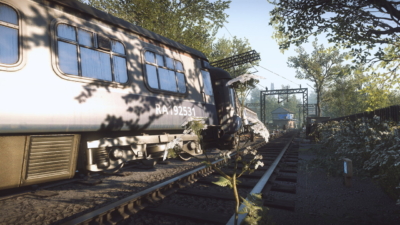
In some places, the village looks normal and undisturbed; in others, there are clear signs of things going wrong.
Jo: So, is EGTTR from the Vault [of Regret]? Or did you pick it up for the discussion?
Rik: I think someone bought it off my Steam wishlist a while ago. But technically, yes, it is from the Vault. Albeit without too much dust gathered on top.
Jo: I think a friend mentioned it to me and then it sat on my Steam wishlist for ages, seemingly never coming down in price, so ended up getting it for cheap up on the PS store.
Rik: [checking e-mails] Ah, Stoo bought it for me in 2016. A 35th birthday present!
Oooh, but what’s down there?
Rik: Despite all the joking about the names being similar, I suppose there is definitely a common thread to all these games. You sort of know what to expect, to a certain extent.
Jo: I suppose things that are designed to focus more on narrative are going to have similarities in terms of structure, if not content.
Rik: You think, I am going to be wandering around, and I might hear from people but never see them.
Jo: And also in terms of being rather more… emotional?
Rik: Ah, yes. Well, you know there will probably be some sad stories or story threads. And there will be other variations, not just the stories, but also how much exploration of the environment is necessary, and whether there will be anything that is like a puzzle, or what level of interaction you have…
Jo: There’s definitely a scale.
Rik: This is from the Dear Esther people, and sort of follows in that minimalist tradition.
Jo: It does, but for some reason the minimalist aspect bothered me less in this one. Maybe it’s because you can hear other characters and have the option to, say, pick up the phone to hear some dialogue (even though you don’t really pick anything up).
Rik: It’s definitely more like some of the other games we’ve covered than Dear Esther was. I thought of Tacoma, although it’s not fair to say that it’s like Tacoma, as that’s the newer game.
Jo: Yeah, I agree actually. It’s more about exploration and the shadows of the characters that inhabited that space.
Rik: You basically just have to go to the right places to find the bits of story, and there’s an orb that guides you. Which I think is meant to represent whichever character’s story is being told? [Each section of the game is introduced with a character name appearing in text] Although I didn’t really get that initially.
Jo: No, me neither.
Rik: Also I failed to really absorb how to perform one of the only actions you need to do yourself, i.e. the ‘tuning’ a static orb to unlock a bit of story.
Jo: So, on the PS4 you have to tip the controller. What was the action on PC?
Rik: The on screen prompt confused me. It sort of indicates you have to waggle the mouse about. You might follow the symbol instead of looking at what’s on screen… I mean, you’re meant to look at what’s on screen [and listen] but the prompt itself seems to be giving you feedback. I had to google it.
Jo: That sounds more complex. I just had to tip the controller one way and then the other like I was trying to tune in, but even so, it wasn’t always as straightforward as it first seemed and I got a bit sweary when I couldn’t get the balance right. Also, at times I didn’t know whether to follow the orb of light, or head off on my own. Did you follow the orb at all times?
Rik: No. I figured that would tell the main story, but if you went off on your own, you might see extra stuff. I’m still not sure if that’s actually right though.
Jo: Well, that’s what I made of it both times I played through. But I still debated it throughout. I’d go off wandering through a field thinking ‘is this a waste of time? Should I just be following the glowy light thing?’
Rik: Later on in the game, I would lose the orb and get lost and then became more paranoid about looking at where it went. I had been quite confident at first that the orb would come and get me if I went off course, but then there was one time towards the end where I went wandering for 40 minutes with nothing happening. Which was a bit annoying. There’s no manual save either, so if you waste time without going the right way you won’t save for a while.
Jo: Yeah, it’s fairly regular in that it seems to save after most dialogue scenes, but generally I’m not a big fan of the autosave. I’d prefer to just save when I want!
Rik: Amen!
Jo: It’s a difficult one really, because the world is so inviting. Every time I was following the orb, I kept thinking, ‘oooh but what’s down there?’, ‘ooh I wonder if I can go in this house?’, ‘oooh maybe I should go clambering through this field?’ But most of the time it proved fruitless.
Rik: It’s strange because there’s so much good detail in many ways, but it’s all mainly window dressing. Static virtual boxes that you can look at but not touch.
Jo: Yeah, most of the houses are just empty shells – even when you can go inside.
Rik: I haven’t seen so many locked doors since a 90s first person shooter.
Jo: Ha!
The Greater Good
Rik: I hadn’t quite realised at the outset that it was set in the 80s.
Jo: No, it took a while to click for me. Although the pints for 50p in the pub should have been a giveaway.
Rik: It was the cars that did it for me. Despite an early glimpse of what looks like a Commodore 64. There’s a police car early on which is very ’80s news report’.
Jo: Same!
Rik: It sounds daft, but all the period detail really did it for me.
Jo: Yes, I agree. I was just about to say, it’s done really well. In the same way that Gone Home captured the 90s – there’s real attention to detail without being tacky or overly obvious (e.g. Rubik’s Cubes everywhere).
Rik: With the vehicles, I was really trying to work out what real models they were based on. There was definitely an ’80s Ford Granada’ vibe to lots of the cars. It’s done well, not a The Wedding Singer approach to hammering you over the head with it all. [NB: I do still like The Wedding Singer]
Jo: It’s tricky to get it just right, I think.
Rik: The pubs are very 80s too, i.e. not places that were inviting.
Jo: I thought the cliquey rural village was captured well – something else that could have easily gone wrong, but didn’t. Although, it did make me think of Hot Fuzz a couple of times. The Greater Good! [The Greater Good…]
Rik: There are a couple of accents on the edge. But, in general, I enjoyed the Britishness of it: the trains, the phone boxes, the pubs. Even the road signs, of which we got a glimpse in Dear Esther. The acting is a little bit Radio 4 afternoon play, maybe even approaching [long-running farming-based radio soap] The Archers territory?
Jo: Haha! You’re right, with the farm and village politics.
Rik: Also I couldn’t tell who the characters were sometimes. Which is a problem I have when I listen to The Archers. People fall into two camps: posh British actor, or rural accent. Here, I had to have the subtitles on. I’m not sure I’d have committed all the character names to memory or followed things so easily otherwise.
Jo: I had to make a list/diagram. There are a lot of characters for a relatively short game, and considering you never see any of them, it was hard to keep track of who was who, who was related to who, who was having an affair with who, whose child belonged to who… At one stage, for example, I was back and forth about whether Eddie was Wendy’s son or her husband.
Rik: Stephen was the son, but then they had different surnames, so I was a bit confused.
Jo: Frank was the brother? Stephen’s uncle? It all got a bit tangled up for me, but initially I thought he was Stephen’s father or step-father.
Rik: Definitely there needs to be some note-taking, although I think to some extent the same things are hammered home enough for you to get it by the end. There aren’t many likeable characters, it’s quite clever in the way that it’s like you’re observing a village, and not seeing things from anyone’s point of view particularly.
Jo: Yeah, I agree. Although I’d say Stephen is definitely the least likeable.
Rik: At first, I really hated both Stephen and Kate…
Jo: I gradually came to dislike Stephen more and more, but I think in the end Kate was the character I liked the most.
Rik: Ah, you see I came to feel some more sympathy for Stephen as it went on, even though he’s obviously arrogant and unfaithful. There was some interesting stuff about him being the local boy made good, and then coming back. Is he trying to prove something? Or reconnect with his lost love, Lizzie, who he callously abandoned years ago?
Jo: Yeah, he’s talked about like he’s some kind of prodigy or something. And then he returns with his ‘yank wife’ – as one of the characters says.
Rik: Yes, Kate, the obvious outsider, an American treated with suspicion by provincial little-Englanders. With a likely race angle to the cold shoulder.
Jo: She’s from America, she academic and career-focused. And she’s not Lizzie. And ultimately there’s the racism.
Rik: She also never wanted to come, and does hate the idea of it even before she arrives. I think she is quite arrogant and unsympathetic too in her own way.
Jo: Particularly during that one interaction with Lizzie. But, I don’t know, I just felt like there was a vulnerability underneath it all.
Rik: Perhaps I hated them both because they are scientific researchers being arrogant, which is a bit close to home in terms of some of my professional experiences! Also she lets the alien plague thing in to kill everyone, while Stephen is running around trying to stop it.
Jo: Does she do it on purpose though? I mean, I perceived it as she was just fixated with the discovery in itself, and not the consequences. Almost like that wasn’t even relevant.
Rik: I suppose is that like their whole argument about living there. He is running around trying to save the village, while she is focused on ‘higher things’…
Jo: Why do they go back there? I’m not sure I quite picked up on it first time around. But is there some kind of significance of the village and the astronomy? Because, it’s a pretty strange place to have these huge, quite scientifically advanced, observatory towers.
Rik: I don’t think it’s ever spelled out. I thought of it as an opportunity that came up close to home, and perhaps it was good for their careers for a few years?
Jo: There’s all the books lying around everywhere about astronomy. A few houses have telescopes in, and then there’s a comment from one of the villagers about how there are ‘a few hobbyists’ locally. I was wondering if there was something especially unique about the village?
Rik: Potentially. I wasn’t clear on whether the observatory was already there or not, but I imagined that it was. Also, Kate has no intention of staying. But Stephen is looking at that fusty old house that needs doing up.
Jo: Yes, he’s thinking about staying permanently, isn’t he, and he has that awkward conversation with Wendy about starting a family.
Rik: Who basically says: Stephen, she won’t be impressed with this mouldy old house (ooh-arrh).
Jo: She was a bit pantomime, Wendy. Although you never see any of the characters, I kept imagining her as a rosy-cheeked, cauliflower perm lady wearing an apron, just fresh from furiously scrubbing something.
Remain Indoors
Rik: So I guess we should say there are two main threads to the story. One, the village shenanigans and individual characters represented by the orbs; and then the monologues from Kate over the various radios lying around, about what’s happening at the observatory.
Jo: Yes. But the village shenanigans also span different time periods.
Rik: Right, so there’s the urgent ‘let’s stop it now’ type stuff. And then some other historical conversations which provide more background. Like the one at the train station where Stephen and Kate arrive, and the ‘yank wife’ comment sets off the first argument about why they’re there. You said you liked Kate as a character?
Jo: Towards the end, yes. When you’re going to each of the towers.
Rik: She’s the outsider, even at the end. Stephen chose Lizzie.
Jo: After dragging her there, when she didn’t want to go. Ultimately, he chose his old life, didn’t he?
Rik: From the moment he leaves the observatory, and she stays, that sort of represents it to me. Going off into the village instead of staying with Kate.
Jo: And while he obviously thought a lot of Kate – at one stage saying something along the lines of ‘she’s the most incredible person I’ve ever met’ – he still wanted a house in Shropshire and babies. In other words, all the stuff that Lizzie wanted.
Rik: Who he already treated badly once.
Jo: And chooses in the end. I think that’s why I disliked him so much. I was bit like, ‘PICK A LANE, STEPHEN!’
Rik: I suppose seeing Dr Kate making notes on how interesting it all was while people were dying made me think, at least he was doing something. But as we touched on, I’m not sure you’re meant to side with anyone particularly. Although you do feel bad for Lizzie as she makes that sad final call.
Jo: Yes.
Rik: I suppose we haven’t really touched on this but I hadn’t realised how this might not have been the best time to play this game, given the current situation. All the stuff about government saying it’s ‘flu. Plus the quarantine, and the order to stay away from other people. Even right down to it being spread through phone lines!
Jo: I was playing a point and click game called Unforeseen Incidents last April during the first lockdown. It was just a coincidence, but that was all about a mysterious flu and quarantine and trying to find a vaccine. You don’t think there are many things that would be similar to what’s happening now, but pandemics and epidemics are good story fodder, I suppose. Like natural disaster movies.
Rik: It made me think of the kind of young adult fiction about apocalypses we did at school. There was one, Z for Zachariah, which was actually set in the US, although my main memories are of a BBC telly version of it, which moved the story to Wales. I think in that there is a nuclear event but somehow this one valley is unaffected.
Jo: So, was Stephen calling in an air strike to stop it from spreading beyond the village?
Rik: Yes. But that didn’t work. I was a bit unsure of the timeline there. Like with all the quarantine stuff. Was it literally that one area that gets sealed off from the rest of the UK and told this false tale?
Jo: I’m not sure. They set up road blocks and stop trains in and out of the village.
Rik: It seems so, but there’s a lot of government propaganda which makes you think of a national crisis. I guess it’s another thing about the 80s setting, information is more easily controlled.
Jo: Yes, their main form of communication is over the phone.
Rik: Which the alien thing is able to get into. Although I guess it could get into the internet, and mobile too if they existed.
Jo: Well, doesn’t it also use the radio waves as well? I guess that’s the thing, isn’t it, that it keeps ‘adapting’…
Rik: Also, is it deliberate to have set it in an insular village, hostile to outsiders? Where information is scarce and rumours percolate?
Jo: Ah, good point. I didn’t think about that.
Rik: I think there is certainly a deliberate throwback to 70s and 80s disaster movies, usually with a nuclear theme. All the presentation is like those government safety videos that made out you could hide under a table from a nuclear explosion. [Protect and Survive – History Ed.]
Jo: It’s a bit like that with the health advice, too. Stay home and drink lots of fluids even though people are bleeding out of their ears and noses and eye sockets. And a few of the characters are a bit ‘oooh err, I don’t think this is the normal flu…’
Rik: I did laugh at the bit where the Welsh couple are playing tennis at this shit rainy caravan park, and thinking, fuck this, let’s go. Even though they can’t get out and end up having a crash involving Lizzie’s boozy husband.
Jo: Yes.
Rik: It’s that same combination of people trusting the government and some deciding to take action. Again, some resonance with the current situation.
Jo: Exactly, people taking matters into their own hands…
Rik: I thought a lot about the Mitchell and Webb post-nuclear game show sketch. Remain indoors! And don’t think about the event!
Like and subscribe
Rik: So, what did you think of this one overall?
Jo: The first time I played this game was a couple of years ago, and I really struggled to get anything out of it (it was when sad things were happening). I left it for ages and eventually got around to finishing it, but by that point I’d lost interest. Perhaps that’s the reason I was a bit reluctant to cover it next. I enjoyed it significantly more second time around, but even so, I don’t love it.
Rik: I think we’ve mentioned the disappointment at the lack of interactivity in the world, which was my main bugbear. You just think of all the incidental period detail there could have been. But maybe it’s not realistic to expect Gone Home levels of detail across a whole village.
Jo: The lack of interactivity is a definite drawback – not so much that there needs to be puzzles per se, just to be able to pick stuff up, or look at it, would be a plus. And possibly one of the main problems with having a cast of totally unlikeable characters is that you don’t form any real connection to the story.
Rik: It was enjoyable putting all the pieces together. But I didn’t really care what happened at the end. The rest is interesting in a gossipy way, and I liked how the overall situation is simmering in the background but the characters themselves are sort of more concerned with their daily stuff.
Jo: I think the ending was disappointing. For me, there’s still an air of pretension, which is a bit of a turn-off.
Rik: I thought the music was a bit ‘much’, at times. Laying it all on quite thick.
Jo: It’s not on the same level as Dear Esther, but there’s still an element of being a bit clever and arty, which I find jarring. But on the whole I did enjoy it. What are your thoughts?
Rik: Yes, I was a tiny bit disappointed at first, then got into it more. I didn’t feel satisfied by the ending, but I’m not sure exactly what I was hoping for instead.
Jo: We haven’t talked about the walking speed…
Rik: No. Which is annoyingly slow, especially if you get lost.
Jo: The first time I played it, the walking speed and the ‘sprint’ speed (which is actually only barely noticeably faster than walking) really got on my nerves. But the second time around it wasn’t as slow as I remembered it.
Rik: Thing is, there is a run button, and it does work. I think it is just more realistic, in terms of what ‘running’ normally is in games. I mentioned offline that I was playing an old first person shooter at the same time as this, and the contrast was very funny, as there I was able to bounce off walls and climb ladders in fractions of a second. Also, it is quite a bone-headed game vs the arty stylings of this one. You’ve got ‘trudging through rural Shropshire at a snail’s pace while orchestral music plays’ on the one hand, and ‘muscle man spouting inanities while blowing baddies into pieces with a shotgun’ on the other. In some cases quite a neat summary of the changes in gaming over the last 20 years!
Jo: Haha!
Rik: It was good, I enjoyed it. I probably wouldn’t go out of my way to recommend it to others though.
Jo: EGTTR or the 90s FPS?
Rik: Oh, Rapture, sorry. You will read EXCLUSIVE thoughts on the FPS, very soon, here on FFG. Like and subscribe guys!
Jo: Ring the bell!
Rik: Buy me a coffee on ko-fi!
Jo: Leave your comment below! Etc.
Rik: Is there anything else you want to add?
Jo: You ain’t seen Bad Boys 2?
Rik: Except for Hot Fuzz quotes.
Jo: I liked it, but I didn’t love it. And I enjoyed it a lot more than Dear Esther. Of the games we’ve covered so far, it’s towards the lower end of the spectrum.
Rik: Same here. I’d say Tacoma plays with the same ideas but is more enjoyable.
Jo: Agree… Mr Skinner, someone’s sicked up in aisle six.
Rik: Mr Skinner to the manager’s office. Manager’s office, Mr Skinner…
Jo: Just the one swan, actually.
Rik: Ok, that’s probably enough of that. [Yes – FFG reader]
—
Everybody’s Gone to the Rapture is available on Steam for £15.99.

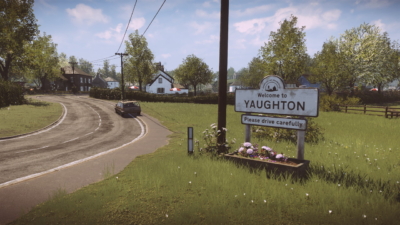
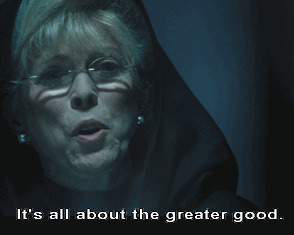
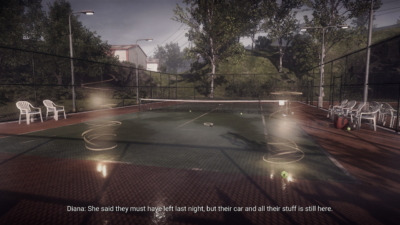
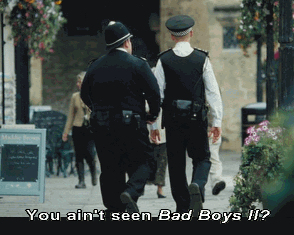


 Posts
Posts
Finally got around to this one!
The depiction of rural england is wonderful, so I spent a lot of the first hour just poking around in fields and houses. Nowadays you’d probably have at least three times as many houses, so it’s a sort of idyll that doesn’t quite exist anymore.
At first the events of the “rapture”, played through the little lightshow vignettes, felt a bit remote. It’s such a cheerful sunny day and it took me a while to sort out the various characters in my head. The sadness built up over time though. You learn more about the people, they feel more real (some great voice acting) and then have to watch them get … Killed? Recorded in the pattern somehow? Removed from this life in any case. That bit with the girl (Rachel?) singing to the baby, knowing they were about to disappear the way everyone else had, was too much. Since becoming a parent I can’t handle that sort of thing – time to switch off for a bit!
Also there’s the growing realisation this has probably spread around the world. As you progress through the game time passes towards sunset which kinda brings home that everything is over for all of humanity.
I came away from it kind of angry at Kate, since it wa her experimentation that empowered the Pattern. Ok I get it her: husband is cheating, she’s a woman of colour stuck in 80s rural england. She’s alone and done with people in general. But in her alienation she brought about a catastrophe.
One bit of the game went kinda wrong for me: in Frank’s section I lost the “orb” and was walking aimlessly for an hour, unable to complete the chapter. The slow movement speed did start to grete here. Had to find a walkthrough (for a walking simulator… The same of it).
Anyways, that aside I’d say its a highly worthwhile experience.
Just a tech note to end, I was getting weirdly low framerates for a game this old, found a fix on the Steam forums: go into Nvidia control panel and try setting either “Low Latency Mode” to Ultra OR “Vertical sync” to Fast..
April 3, 2024 @ 11:14 am
Glad you enjoyed it! I agree, poking around in a version of England’s past is a big part of its charm. I loved the old street signs, cars and trains, and going into the pub.
Too much time has passed to be certain it was in the same place, but I definitely had a similar experience of getting lost and being unable to locate the orb at one point.
April 7, 2024 @ 3:43 pm